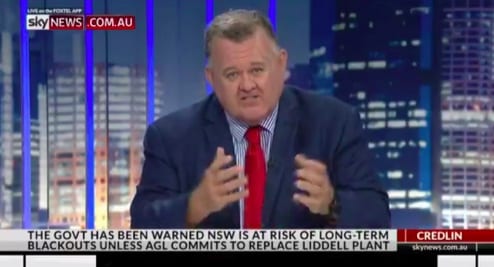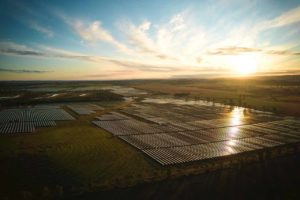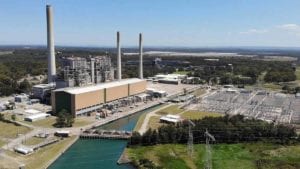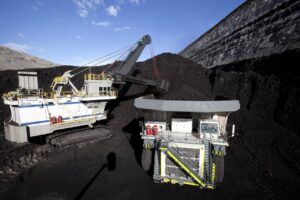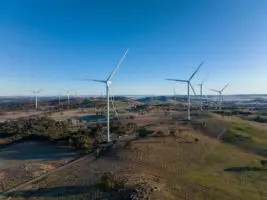Craig Kelly, the chairman of the Coalition’s backbench energy committee, clearly doesn’t think much of wind and solar, and it appears he thinks even less of this website.
A reader this week sent Kelly a link to a story we published on Monday – or, more to the point, republished from The Conversation – which was co-authored by ANU researchers Andrew Blakers and Matthew Stocks, and which predicted a rapid switch from fossil fuels to renewables.
It was titled: Solar PV and wind on track to replace all coal, oil and gas within two decades.
Kelly and/or his office erupted, and he or his minders promptly replied with this email:
So, let’s go into Kelly’s email in detail. It was only a few paragraphs long, but it was Biblical in its bending of the truth.
“According (to) the International Energy Agency’s statistics – solar PV and wind combined currently provided just 0.8% of the world’s energy.”
 Yes, that’s what the briefing notes from the fossil fuel lobby and the likes of Bjorn Lomborg will tell you. But we’ve dealt with that here, and here, and here, and here.
Yes, that’s what the briefing notes from the fossil fuel lobby and the likes of Bjorn Lomborg will tell you. But we’ve dealt with that here, and here, and here, and here.
This effort to diminish the role of variable renewables like wind and solar includes their role in “primary energy”, which includes heat and transport, in which wind and solar obviously play a negligible role for now. But what counts is the future (see graph to the right). And there is more of that below relating to Kelly’s predictions.
Kelly says: “They (the IEA) estimate that with even with an aggressive update of renewables, that by 2040, the world be using more fossil fuels than today and solar and wind will be supplying around 3% of the world’s energy needs.”
Actually, the IEA suggests that with an aggressive uptake of renewables, one that seeks to address the science of climate change that Kelly denies, renewables will account for 60 (sixty) per cent of total electricity generation by 2040 (half of that from wind and solar), compared to 6 (six) per cent by coal – and even that level of coal will come only thanks to a technology that currently has no economic prospects, carbon capture and storage.
This next graph above shows the share of wind and solar in power generation – more than 40 per cent in places like US, and India and in the high 30s across the world and in China, the EU and the Middle East.
Remember, this is the IEA, the ultra conservative body that has consistently underestimated the uptake of wind and solar – sometimes by a factor of 10.
And they reckon wind and solar will be by far the biggest contributors to global electricity generation – at a time when more heat and transport is electrified – by 2040.
The IEA report also makes it clear that with an aggressive update of renewables, the world will NOT be using more fossil fuels than today, as this graph above shows. Indeed, coal gets overtaken in total primary energy demand (including heat and transport) by “other renewables”, essentially wind and solar.
And this is what happens to coal – a fall of 80 per cent from business as usual in power generation by 2040 – if efforts are made to act on climate change. A nice allegory to the situation in Australia, and why coal-defenders like Kelly are hell-bent on stopping any such policies.

And this is yet another graph to illustrate how the IEA sees wind and solar getting to more than 33 per cent of total electricity generation by 2040.
“The fact that RenewEconomy can publish an article titled ‘Solar and wind on track to replace coal oil and gas’ is just another example of how RenewEconomy lack a even a shred of credibility.”
This from a man who once said that renewables would cause children to drown.
As mentioned above, this was a reprint from The Conversation and an article written by two highly respected university researchers. But no matter, we would have been happy to print it on its own merits, as we have with Sanford University’s Tony Seba’s predictions of the death of fossil fuels by 2030.
“…and are nothing other than the shameless propaganda arm of green rent seekers ….”
Aw, shucks. We just note that fossil fuel subsidies, as noted by both the IMF and the IEA, far outstrip subsidies for renewable energy.
“… with one objective; to keep the subsidies flowing.”
Actually, no. We’ve pointed out that many of the newly announced renewable energy projects in Australia carry no subsidy – the bundled price of energy prices and RECs is actually lower than the current wholesale price.
RenewEconomy simply argues that the government should be respecting the science, and the global treaty it is signed up to, and have concern for environmental impacts. As for renewables, they just need a level playing field. The market is designed for fossil fuels, it needs to change.
“And they don’t give a dam (sic) about the hardship they are inflicting upon other Australians.”
Well, actually we do, and we’ve said so since we launched six years ago, when even then it was clear that a renewables future was cheaper, cleaner and safer than a fossil fuels and that customers were being screwed by the fossil fuel oligopoly that was fighting not just a carbon price, but renewable schemes, energy efficiency initiatives, demand management programs, battery storage and any other technology or smart scheme that might crimp their profits and save consumers money.
And the fossil fuel majors have had a powerful voice of support in the likes of Kelly and his mates in the Monash Forum.
RenewEconomy has railed against the new conservative government in South Australia and its apparent decision to knock on the head a privately funded program to deliver solar and storage to low income houses – and so slash their energy bills – and replace it with their own scheme to provide direct grants and subsidies to those rich enough to have already installed solar.
We were outraged by the efforts of the network owners to lift fixed charges, an often cynical ruse that penalises solar households but more insidiously low energy consumers like pensioners, effectively charging them north of 72c/kWh. That’s $720/MWh for mostly coal power.
How ridiculous is that? And where was Kelly shouting down the fossil fuel rent seekers when that occurred?
If Kelly did give a damn about the disadvantaged consumers in his electorate and elsewhere then he would be pushing for scheme to ensure they too got access to solar and storage, instead of peddling this nonsense.
Kelly’s position is a disgrace, and so are those who defend, tolerate and even promote his views. 2GB. Murdoch press. Sky News. Prime minister Malcolm Turnbull.

